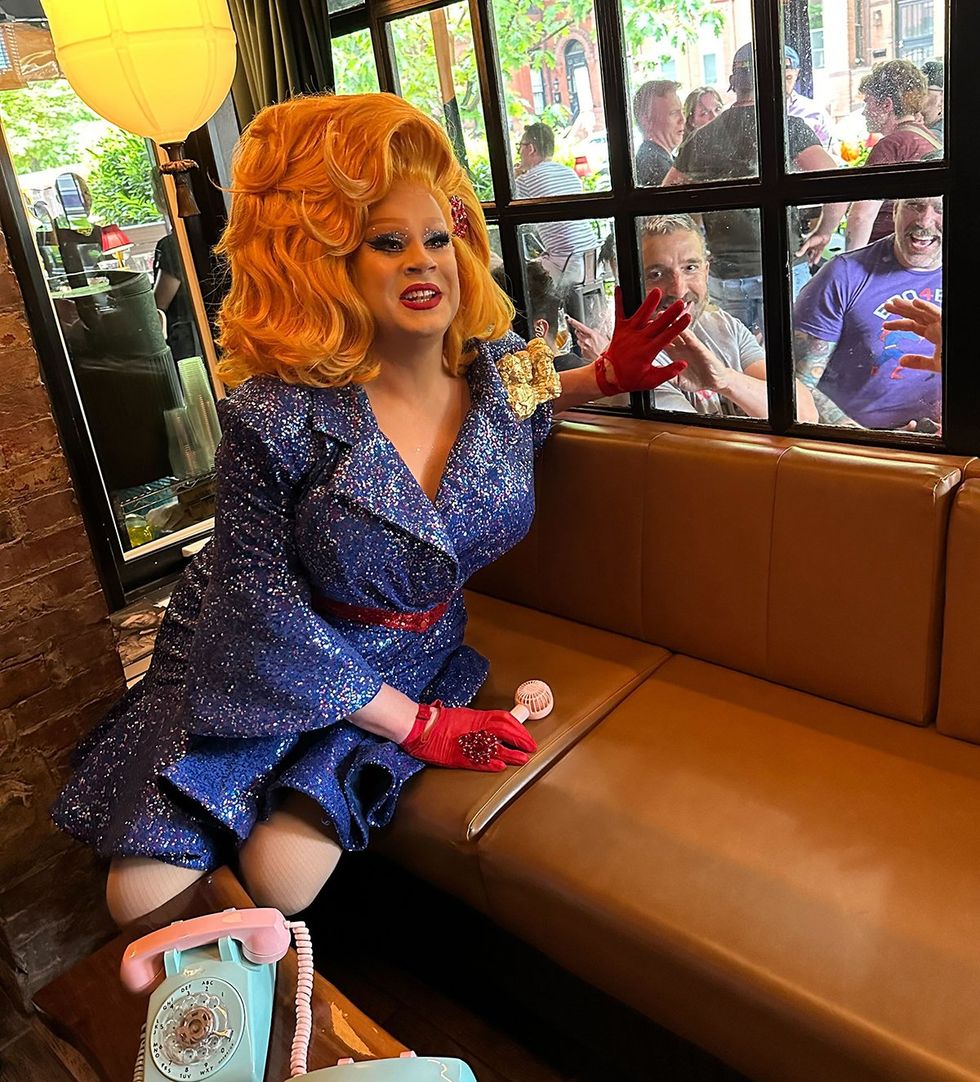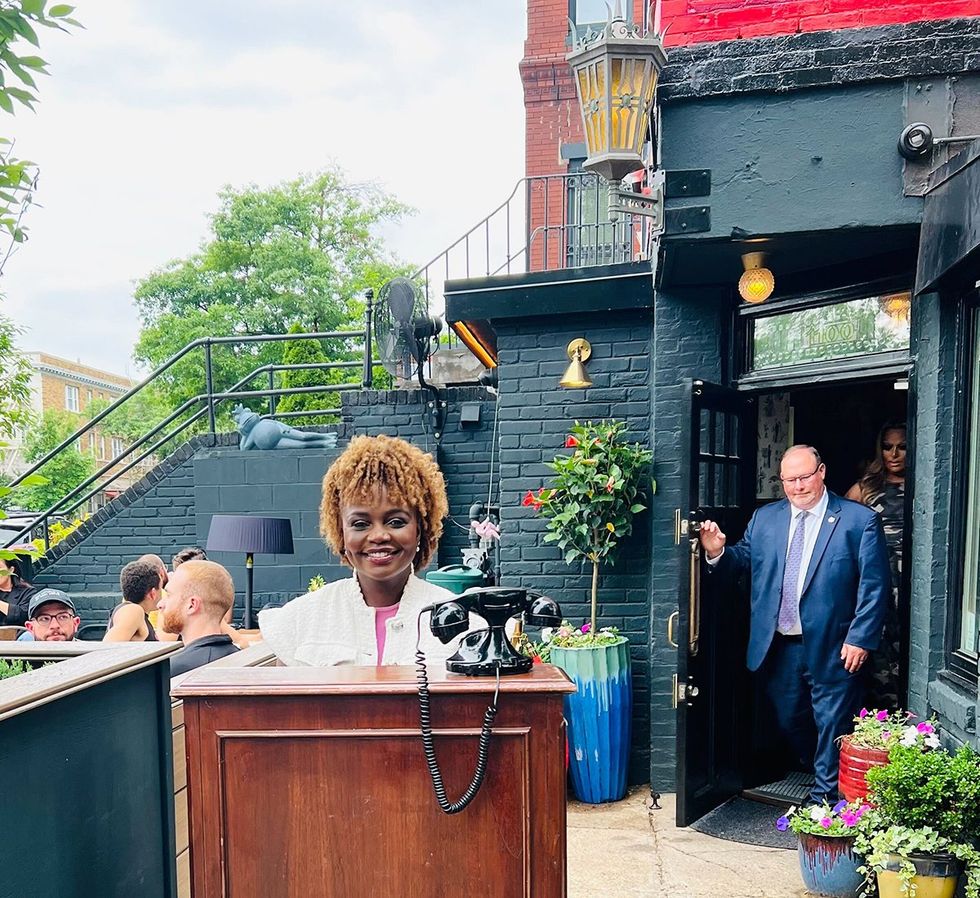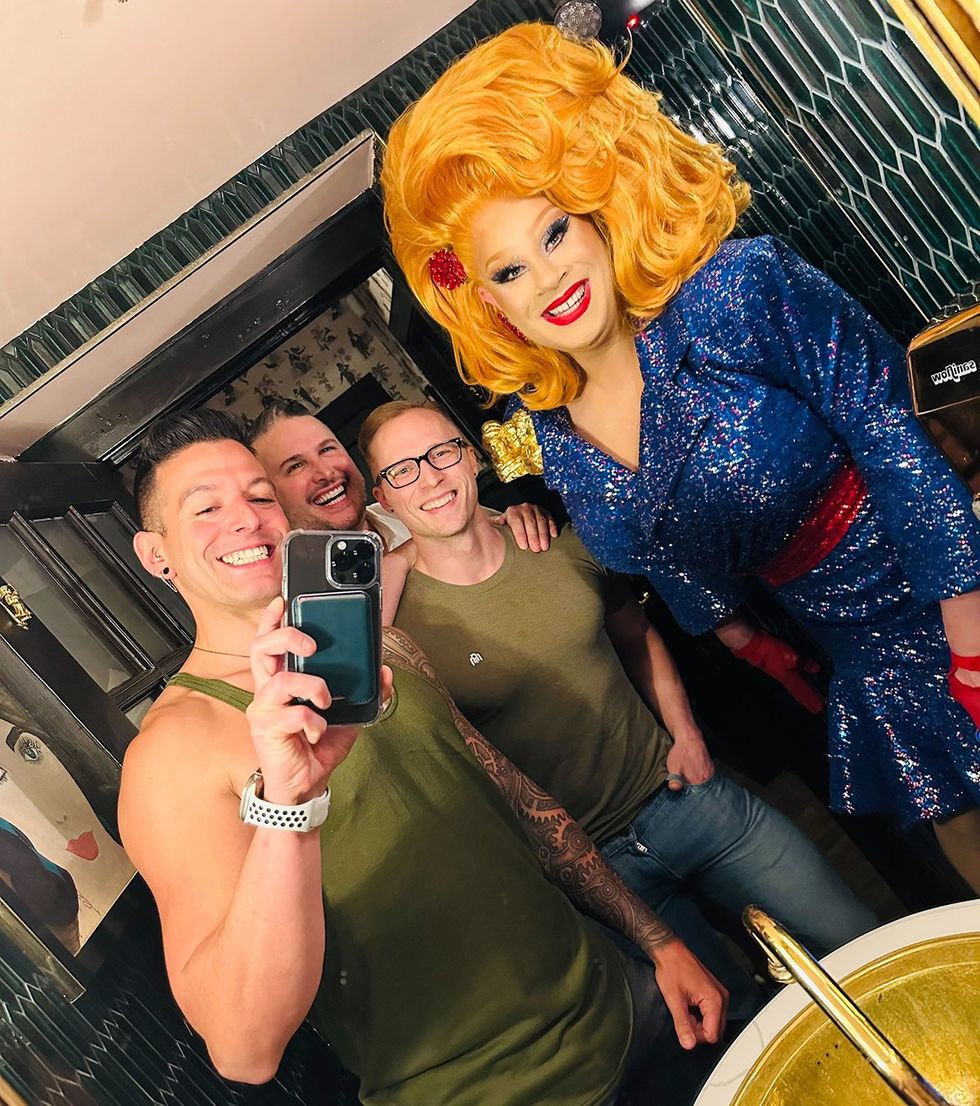The vibrant queens of the ninth season of RuPaul’s Drag Race All Stars brought their charisma, uniqueness, nerve, and talent to the nation’s capital on Monday. The eight ladies showcased their advocacy and engagement against a backdrop of political significance. Their visit, highlighted by a screening of the season premiere at the Motion Picture Association near the White House, emphasized drag as a transformative and vocal art form.
Keep up with the latest in LGBTQ+ news and politics. Sign up for The Advocate's email newsletter.
This season’s cast, each competing for a charitable cause, includes Angeria Paris VanMicheals advocating for the National Black Justice Collective, Gottmik championing Trans Lifeline, Jorgeous supporting the National Alliance on Mental Illness, Nina West advocating for The Trevor Project, Plastique Tiara aligned with The Asian American Foundation, Roxxxy Andrews supporting Miracle of Love, Inc., Shannel aiding the Anxiety and Depression Association of America, and Vanessa Vanjie championing the ASPCA.
 Dito Sevilla
Dito Sevilla
During their time in D.C., the queens visited iconic landmarks such as the Lincoln Memorial and participated in interviews with D.C. and LGBTQ+ press, emphasizing the charitable focus of this season. They also took photos in front of the Reflecting Pool with the Washington Monument in the background and at the Capitol, dressed in red, white, and blue outfits to pay homage to one of RuPaul’s iconic looks.
In the afternoon, the queens visited the Little Gay Pub, a popular bar in the Logan Circle neighborhood, where White House Press Secretary Karine Jean-Pierre met with the performers. She discussed her day’s activities, including conducting the daily press briefing and “doing prep with the POTUS,” to which Nina West humorously inquired, “What is the POTUS?” eliciting laughter from the group. They discussed civic engagement and how drag artists can use their platforms to speak up for LGBTQ+ activism, especially in the challenging societal climate.
The queens and press secretary were welcomed by co-owners Dito Sevilla, Benjamin Gander, and Dusty Martinez.
Sevilla expressed immense pride in the recognition the pub received in connection with the event.
“We received the call last week, and it’s felt very surreal ever since,” he told The Advocate. “When MTV referred to The Little Gay Pub as a landmark, that filled us with an unimaginable amount of pride. We’ll never be the biggest gay bar, but we can be the most meaningful.” Martinez echoed this sentiment, sharing his astonishment and gratitude. “I’m still in shock about how unbelievable yesterday was,” he said. “I’m humbled by their team reaching out to us and calling us a landmark in D.C. It’s truly such an honor to be considered a place for special occasions like this. We’re just a Little Gay Pub, and to have Drag Race all-stars and Karine Jean-Pierre step foot in here makes me proud of what we’ve created.”
 Dito Sevilla
Dito Sevilla
Among the 100 or so people invited to attend the screening was admitted Drag Race super fan, U.S. Rep. Robert Garcia, an out Democrat, who told The Advocate that he enjoyed the event.
In interviews with The Advocate after the screening that followed the Little Gay Pub visit, Nina West, Angeria Paris VanMicheals, and Shannel shared their insights about their visit and the broader impact of drag. West passionately defended drag’s role within the LGBTQ+ community, highlighting its historical significance as a protective and vocal force.
“Drag forever has been kind of like the art form or the guardian that has kind of protected and raised its voice for our LGBTQ+ community,” West said.
West articulated why drag, due to its visibility and distinctiveness, often becomes a target for criticism, suggesting that its conspicuousness makes it an easy mark for those uncomfortable with its message of inclusivity and difference.
“It’s this visible, tangible point with which people can latch onto otherness,” she said.
Recent years have seen a rise in threats, protests, and even violent actions by opponents who argue that drag is inappropriate for children. This contentious atmosphere has prompted lawmakers in at least a dozen states to propose legislation aimed at curbing drag performances on public property or in settings where minors may be present. Despite these efforts, most Americans oppose laws restricting drag, according to a poll by NPR-PBS NewsHour-Marist.
The legislative landscape has shifted significantly, with laws limiting where and how drag performances can occur being enacted in six Republican-led states last year. However, federal court orders have rendered these laws unenforceable in states like Florida, Montana, Texas, and Tennessee. Moreover, GOP leaders in Congress have taken steps to restrict drag shows, including a notable decision by top defense officials to ban drag performances on military bases following pressure from House Republicans.
West argued that drag performers are among the most “resilient, steadfast, dedicated, focused, brave people” who tirelessly advocate for LGBTQ+ rights, often in the face of significant adversity. She highlighted the dual nature of drag as a form of artistic expression and a means of social activism, uniquely positioning performers to engage in societal dialogues about diversity and acceptance.
Expanding on her experience in Washington, D.C., West described the atmosphere as empowering and impactful, especially given the city’s role as the heart of American political power. “When we’re here in the nation’s capital, when such conversations are happening within this country about drag bans and book bans and drag story hours, and kind of how people see us on the other side of the aisle, it’s empowering, and it’s impactful,” she said. West hoped that her presence in D.C. would highlight the substantial contributions of the drag community not only there but across the nation. She pointed out that many local queens lack the extensive platforms that shows like Drag Race provide while doing essential, often unrecognized work daily.
“I have friends in Salt Lake City, Los Angeles, New York City, and Poughkeepsie all over this country doing dangerous work because they have to. They believe intrinsically in their blood that it is required of them.”
 Dito Sevilla
Dito Sevilla
Angeria Paris VanMicheals emphasized the profound importance of the queens’ presence in Washington D.C., particularly near symbolic sites like the White House.
“It is so important for us to be here right now,” she said, noting the acceptance the queens felt during their visit.
This was only her second time in the city, yet she felt a strong sense of progress and optimism. VanMicheals expressed hope that their visibility would help people who might not typically encounter drag performers. “If it starts with us, it’ll trickle into everything else, and then honestly, we could just be a better country,” she mused, highlighting the potential for positive change stemming from their efforts.
Further discussing the evolving perception of drag, VanMicheals reflected on how attitudes have shifted since she started performing. She pointed out the paradox of RuPaul’s Drag Race being incredibly popular and simultaneously subjected to scrutiny and legislative hostility.
“It’s so great that we are still able to have Drag Race, if anything else because you would think that after all this that’s going on and them trying to ban drag, it would affect us and the show, and it hasn’t,” she observed.
VanMicheals spoke about the necessity of continuing to showcase drag culture, especially through the show, to educate and challenge misconceptions. “We’re here, we’re shining. We got another season. We’re going to have another season after that and another season after that, and we are going to keep all trying and pushing until all these bans just disappear into thin air,” she declared.
Shannel reflected on the impact of recent years on the LGBTQ+ community and broader societal attitudes, linking these changes to political leadership and global crises. “I think a couple of things have happened. I think 2020 happened, and when the world shut down, everybody lost hope in humanity and the world,” Shannel said. She noted that many societal values were sidelined as the world grappled with the pandemic, and political dynamics further exacerbated the challenges faced by minority communities. “Politically, Trump comes into office and ruins everything, has taken the voice of women away, of minorities away,” she explained, highlighting the trickle-down effect of leadership that fails to protect vulnerable groups.
Shannel also expressed gratitude towards the queer community and public figures who have worked to reinvigorate the LGBTQ+ community’s voice. This gratitude extends to platforms like RuPaul’s Drag Race, which she credits with keeping the community visible and vibrant. “Thank God for RuPaul’s Drag Race. I mean, 16 years in, and it’s thriving, it’s surviving. It’s amazing,” she said.
Shannel compared the art of drag to being a superhero, highlighting drag’s transformative power: “We get to be storytellers. We’re magicians. Our cape is our makeup and our wigs and our jewelry.” She encouraged those unfamiliar with drag to approach it with an open mind, likening the experience to discovering a new film genre. “It’s kind of like watching a Marvel movie for the first time,” she explained, emphasizing how drag, much like popular movies, can challenge perceptions and bring joy.
During their visit to Washington, D.C., the queens’ advocacy and performances celebrated their art form and reminded them of the ongoing struggle for equality. Their discussions and activities highlighted drag’s significant role in cultural and political debates, echoing a message of hope and resilience that resonates far beyond entertainment.
The new season of RuPaul’s Drag Race All Stars premieres on May 17. The show promises to bring more than just entertainment to the screen; it aims to spotlight critical social issues and foster community and advocacy among viewers.


 Dito Sevilla
Dito Sevilla Dito Sevilla
Dito Sevilla Dito Sevilla
Dito Sevilla


































































Charlie Kirk DID say stoning gay people was the 'perfect law' — and these other heinous quotes